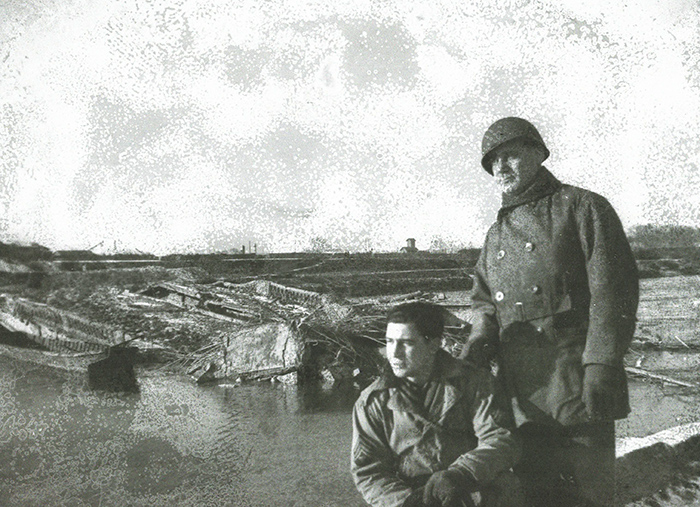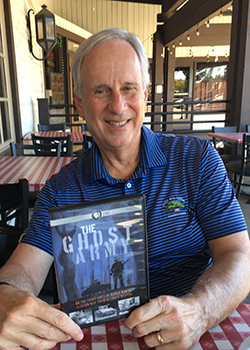


SAN DIEGO — Bert Edelstein elevated his hand one foot above a table. “My correspondence file is almost this thick,” he commented. He had sent letters to the House of Representatives and the Senate. After the House adopted legislation to recognize the Ghost Army with a Congressional Gold Medal, the focus turned to the U.S. Senate. Under the rules, for the measure even to be considered in committee, it must have at least 67 co-sponsors — two-thirds of the full Senate. The count is getting closer and closer.
Edelstein has been involved in advocating for the legacy project ever since he learned that his father, Philip Edelstein, had been a member of the 1,100-member unit that used deception and their wits to lure the Germans during World War II to concentrate their forces against phantom U.S. opponents.
In getting the Germans to send troops against squadrons of inflatable tanks and artillery that looked realistic to aerial reconnaissance pilots, the 23rd Headquarters Special Troops and 3133d Signal Service Company broadcast loud sounds of tank movements and soldiers cussing. Members of the 23rd went to bars in towns where Nazi spies were believed to be loitering and pretended to talk drunkenly about forthcoming offensive operations. Other members of the unit simulated radio transmissions regarding troop movements.
Philip Edelstein was among those radio technicians who not only fooled the Germans, but who were able to listen in on their conversations, thanks to his ability to speak German (which was not very different from his boyhood Yiddish.)
The whole project remained top-secret for many years after the war on the assumption that make believe battalions might someday have to face Soviet troops. Bert’s father, an insurance salesman, “died in 1965 when I was 12,” Bert told me. “The Ghost Army activities remained classified until 1996. He, faithful to his service, did not tell anybody, even my mother Ruth. She died in 2003 and went to her grave not knowing what he had done.”
Philip had kept his discharge papers, which included the fact that he had been a technician fifth grade with the Signal Company of the 23rd Headquarters Special Troops. Bert shared that information with his cousin Bonnie Orlin of Massachusetts, who did a Google search, and asked “Did you know that your father was part of the Ghost Army?” Orlin, a librarian, found a roster of soldiers from New York who served in the Ghost Army, and sure enough the name of Philip Edelstein was on it.
“You have to understand the emotional impact in being reconnected to my father, who was a wonderful guy, a great dad — a terrible loss to me,” Bert, a psychologist, commented. Even all these years later, talking about it brings a catch to his throat. He decided to help to win recognition not only for his father but for all the other service personnel who served in the Ghost Army.
The drive was aided by the Public Broadcasting System’s airing in 2013 of the documentary The Ghost Army that was directed and produced by historian Rick Beyer. The documentary, available in disc format, shows previously secret footage of the Ghost Army inflating the tanks that could be easily–although stealthily– moved from one location to another. It also showed how the sounds of tank movements were recorded on wires (in use before tape recording) and included photographs and movies of some of the actual Ghost Army personnel.
Beyer sent to Bert an electronic file of JPG-format photos of the Ghost Army and among them were some of Bert’s father. “I ran upstairs and showed my wife. ‘Karen,’ I said, ‘That’s dad!’ So, all of a sudden, I am looking at my dad and knowing what he was doing.” Today, some of those photos may be found at the World War II Museum in New Orleans.
Beyer noted that Philip Edelstein was in Troop A of the 23rd Headquarters Special Troops — as was Stanley B. Nance, who today, at age 104, is one of nine still-surviving members of the Ghost Army. A Zoom session via Internet was arranged and when Nance was told he was talking to Phil Edelstein’s son, his face lit up. “He was a fine man!” the old veteran commented. Bert afterwards commented, “To be connected with somebody who was there with my father was another thrill.”
From Beyer, Bert learned about the Ghost Army Legacy Project’s efforts to win Congressional Gold Medal recognition for the unit. He immediately signed on and began making phone call after phone call to congressional staff members and following up those phone calls with letters urging them to brief their bosses about the legislation. On May 18 of this year, the House of Representatives approved the bipartisan bill (HR 707) introduced by Reps. Ann McLane Kuster (D-New Hampshire) and Chris Stewart (R-Utah).
“The Ghost Army saved thousands of allied lives during humanity’s darkest hour, but because their missions were kept secret for decades, they were never recognized for their extraordinary accomplishments,” Kuster commented at the time. “I’m proud that my Ghost Army Congressional Gold Medal Act has passed the House, and I hope that the Senate will pass this bipartisan legislation to award these brave Americans the Congressional Gold Medal and ensure they receive the long-overdue recognition they deserve.”
Stewart commented: “For years, these soldiers and their families haven’t received the recognition they deserve. Three months ago, I was honored to introduce bipartisan legislation that seeks to right that wrong. Today, I couldn’t be more proud to see that legislation pass the House. To my Democrat and Republican colleagues in the Senate: Let’s pass this bill and give the Ghost Army heroes the highest honor we can.”
In a phone conversation, Beyer told me that Edelstein’s efforts were responsible for persuading quite a few members of Congress, on both the House and Senate sides, to get behind the legislation.
As of Veterans Day on Nov. 11, 63 senators had formally signed on as cosponsors of the Senate version of the bill (S. 1404) and two other senators indicated that they would do so in the near future, according to Beyer. That left two U.S. senators to go.
California’s two U.S. senators — Dianne Feinstein and Alex Padilla — have both become co-sponsors. Besides Feinstein, there are eight other Jewish senators. Five have become cosponsors — Richard Blumenthal of Connecticut; Ben Cardin of Maryland; John Ossoff of Georgia; Jacky Rosen of Nevada; and Senate Majority Leader Charles Schumer of New York. As yet unresponsive are Bernie Sanders of Vermont, Brian Schatz of Hawaii, and Ron Wyden of Oregon. All the Jewish senators are Democrats.
Beyer expressed confidence that the magic number of 67 will be reached in a few weeks.
*
Donald H. Harrison is editor of San Diego Jewish World. He may be contacted via donald.harrison@sdjewishworld.com
My London-born father and his 2 younger brothers were all involved in the British military war efforts. My Dad was British 8th Army and was awarded a purple heart.
No one knew they were Jews.
Later, in America my Dad became famous in his field,
but I never learned of his Jewish upbringing. Not until I was 65yrs.old.
Please. Please. Tell your veterans not to be ashamed or hide their backgrounds because of anti-Semitism.
I AM SO PROUD TO BE MY FATHER’S DAUGHTER.
And have relatives in Israel 🇮🇱.
My American Army sweetheart veteran told me all about “feint tanks” & the “Ghost Army”.
I loved it!
Please tell the True History 👍 to ALL of us! Thank you. 💟
Alison Fletcher